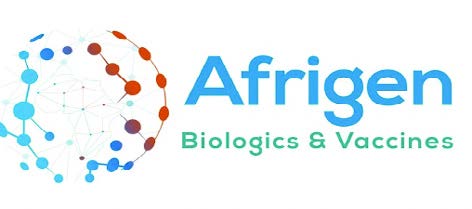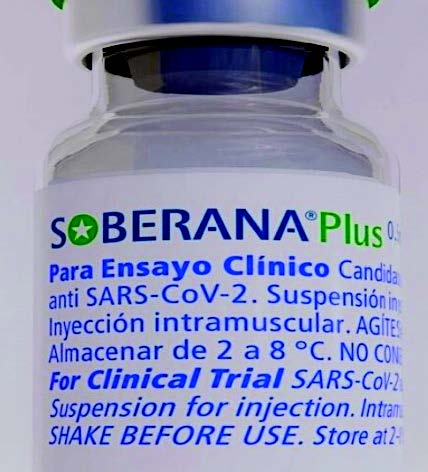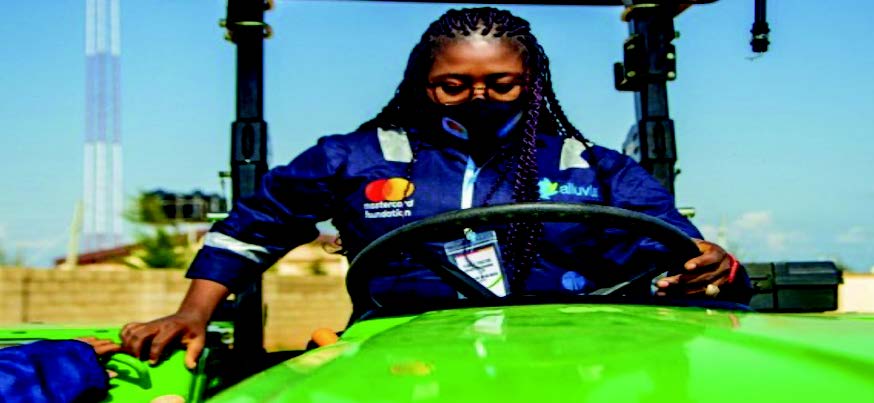
Africa to produce COVID vaccine – Big Pharma not happy
Africa is making a bold move that would take the continent from import dependence to self-sufficient production of life-saving vaccines for coronavirus, tuberculosis, and perhaps HIV. Two manufacturers are establishing an mRNA vaccine technology transfer hub in South Africa that would allow it to produce its own vaccines on its own terms. It’s a way to address just how exposed countries are if they don’t have their own vaccine manufacturing capacity. Africa imports about 99% of routine immunizations and is the least vaccinated against coronavirus in the world. It’s not the first time the World Health Organization (WHO) has done this. A similar technology-transfer program for influenza vaccines has led to hundreds of millions of extra flu vaccines since 2007.
The WHO pitched an mRNA tech-transfer hub that would let multiple companies share the knowledge of how to produce vaccines from start to finish. Two South African companies — Afrigen Biologics & Vaccines and Biovac, have been chosen as the initial partners for the first hub. Afrigen would help transfer the technology from an mRNA vaccine developer to other manufacturers with the support of a network of universities and the Africa Centers for Disease Control & Prevention. To get the hub up and running in a year, when it could still help end the pandemic, its partners need Big Pharma’s help. However, neither Moderna nor Pfizer has signaled interest in working with the facility. According to the WHO, the hub would make it possible for African companies to begin manufacturing mRNA vaccines, the advanced technology now used in vaccines from Pfizer and Moderna in as little as 9-12 months.
The instability of mRNA vaccines requires very cold storage. Afrigen could access technology to produce a thermo-stable mRNA vaccine that could be kept at temperatures between 2 to 8 degrees Celsius. Afrigen’s facility will be capable of producing a maximum of 10,000 vials a day of vaccines and has partnered with local manufacturer Biovac which can produce 30 to 50 million
doses a year to distribute across Africa. Research partners include leading South African universities and the KwaZulu-Natal Research Innovation & Sequencing Platform (KRISP) genomics surveillance lab, which helped detect the Beta variant dominating a third wave of South African infections.
Under the terms set by the WHO, there are two ways the hub can use the technology. It either needs to be free of intellectual property constraints in developing nations, or it can make those rights available to recipients through non-exclusive licenses to produce, export, and distribute the vaccine in these nations.
The choice of South Africa was deliberate. The research conducted by both by the Medicines Patent Pool and WHO, indicates that there is no intellectual property barrier in South Africa for the production of mRNA vaccines. That means there is currently no patent application for an mRNA vaccine in the country, even though a patent application could still emerge.
However, Alain Alsalhani, a pharmacist for Doctors Without Borders, thinks that Big Pharma won’t do anything without direct benefit. If drug makers want to share their technology with a manufacturer in Africa as a form of “social responsibility” or a way to improve their public image, “they can do it bilaterally,” he said. “They get the good press, but they also hold complete control over everything,” he added. “What they see in the hub is clearly a way for them to lose control over their technology.”
Petro Terblanche, managing director of Afrigen said the involvement of Big Pharma would be welcome, but the hub will go ahead without them if need be, and the platform needs to survive post-pandemic. “It has to be a multi-purpose and a multi-product platform,” she said, indicating that flu, tuberculosis, HIV, and Ebola are all areas that would be explored. She said people underrate the knowledge base in South Africa. However, in her small team of 15, there are over 60 academic degrees between them. (Source: Reuters/Politico)
Cuban COVID vaccines move forward

Iran is the first country outside of Cuba to start producing one of the island’s homegrown COVID-19 vaccines on an industrial scale. The allies are under fierce US sanctions that have long encumbered access to medicines and medical inputs, motivating them to be self-reliant. Both have produced a raft of experimental coronavirus vaccines like Cuba’s Soberana 2. Iran’s Pasteur Institute agreed earlier this year to collaborate with Cuba’s Finlay Vaccine Institute, which developed Soberana 2, to implement phase three clinical trials of the vaccine in the Islamic republic, leading to its approval for emergency use early in July.
Cuba and Iran will produce millions of doses of Soberana 2 under the name PastuCovac. Finlay Institute Chief Vicente Vérez Bencomo said during a visit to Tehran. “Usually you need 15 years to develop a vaccine from zero to the industrialization phase, but we did all the steps in a year, and the evidence is that it works very well.”
Preliminary Cuban data from late-phase clinical trials suggests Soberana 2 and its other most advanced COVID-19 vaccine Abdala are among the world’s most efficient, with more than 90% efficacy, although critics say they will remain skeptical until it publishes the figures in international, peer-reviewed journals.
Soberana 2 is the world’s only conjugated anti-SARS-CoV-2 immunogen. The virus antigen, the receptor-binding domain (RBD), is chemically bound to tetanus toxoid, while Soberana Plus includes two RBDs bound together with aluminum hydroxide and is the only vaccine project that is being studied in the convalescent population. According to the scientific staff, the product has been selected to boost a pre-existing immune response, either in patients who have been infected by the virus or in people vaccinated with other candidates.
Italian media reported that the local health agency in Turin is evaluating the effectiveness of the Soberana Plus vaccine against variants of the SARS-CoV-2 virus. Cuban medical teams provided medical care to Italy and other nations when the coronavirus first broke out in 2020 before a vaccine was available. The virology laboratory of the Amedeo hospital in Turin, in collaboration with the infectious diseases clinic directed by virologist Giovanni Di Perri, is investigating the capabilities of Soberana Plus developed by Finlay Vaccine Institute, to evaluate possible applicability on the current variants in circulation.
Clinical trials in Cuba with the vaccination scheme that included two doses of Soberana 2 and a third dose with Soberana Plus have shown an efficacy of 91.2% for the symptomatic disease, 75.7% for infection, and 100% for severe symptomatic illness. This scheme has already obtained approval for emergency use in Iran and is in the process of being approved in Cuba.
Cuba’s biotech sector has a long history of vaccine development, producing 80% of vaccines used in the Caribbean island nation and exporting some of them. Mexico, Vietnam, Argentina, and Jamaica are among the countries that have expressed an interest in producing or buying Cuba’s COVID-19 vaccines. That could provide an economic and diplomatic boost to the cash-strapped nation, which has faced recent criticism over its crackdown on unprecedented protests as well as support for its demand that the US lift its trade embargo. (Source: oncubanews.com/newsamericasnow.com)
Nigerian women step-up in male-dominated farming industry

Farming collective Alluvial Agriculture is training 50 women in tractor mechanics. The initiative will create female-owned tractor businesses serving women farmers. The program is part of a joint initiative with Mastercard Foundation and training from Tata International Nigeria and Alluvial Agriculture.
For the past 13 years, Linda Sheknami Auta has grown rice, maize, yam, and soybeans by hand. It’s a long and arduous process that prevented her from growing her business as quickly as she would like. Ploughing her 20 hectares farm in Niger State in Nigeria’s Middle Belt takes the equivalent of five months of hard work. With the right equipment and training, this could be cut to just 10 days. But finding the financing, tools, and farmworkers are tough, especially for women.
“Women in my industry are often looked down upon, considered too weak to be doing what is traditionally considered a ‘man’s job,’ so it has been hard to hire labor,” said Auta. “Unfortunately, some men just do not want to work for a female boss.”
A new initiative by farming collective Alluvial Agriculture seeks to level the field for female farmers. The company, which provides education and market access for small producers across Africa, has begun training and financially supporting 50 women across 15 Nigerian states to become tractor owner-operators.
“For too long, women have been excluded from agricultural finance and mechanization, despite the fact that they are the backbone of our industry,” said Dimieari Von Kemedi, co-founder and managing director of Alluvial Agriculture. “Our program is an important step in addressing this imbalance.”
Training is being provided by a joint venture between the Indian conglomerate Tata International and Alluvial. After the three-week course is completed, each woman will form partnerships or cooperatives. Each cooperative will be provided with state-of-the-art John Deere tractors and will work on at least 5,000 hectares of female-led farms that are part of Alluvial’s community block farm projects. A percentage of fees earned by the women will be used to repay the loan for their tractor. Based on expected earnings from tractor leasing, the women should have paid for their first tractor within two or three years. Each of the new female-led businesses is expected to own between 20 and 50 tractors by 2028.
“The Mastercard Foundation is very excited about this partnership as it is an opportunity to drive inclusive growth for women in farming,” said Chidinma Lawanson, Nigeria director at Mastercard Foundation. “Training young women to take up space in the male-dominated sector is innovative and promotes gender equality. We look forward to many more women gaining such jobs in agriculture, a major sector of the Nigerian economy.”
Female farmers across Africa struggle to cultivate their own businesses and are denied access to formal financial support and agricultural training – symptoms of continued gender inequality that permeates throughout African societies, says Chijioke Okoli, Nigeria director for agriculture and construction equipment at Tata Africa Services.
Alluvial Agriculture is a private sector response to decades of failure to tackle one of the world’s most pressing issues — food insecurity. It deploys an innovative business model that provides comprehensive support to small farm enterprises. This support spans training, technology, land preparation, irrigation, input supplies, and market access within contiguous farms in community and virtual blocks. Their partnership with communities, research and financial institutions, agtech companies, and value chain actors, produces several high-quality crops and an enabling environment for farmers to sustain and scale up their activities. The Mastercard Foundation is a Canadian foundation created in 2006 and is one of the largest in the world with more than $39 billion in assets. (Source: AllAfrica.com)


